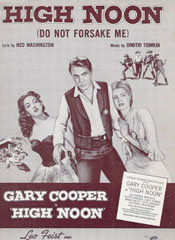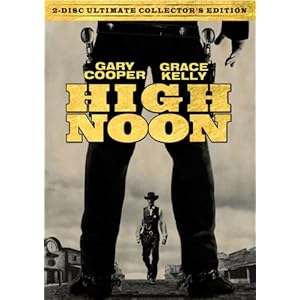Discussing one classic film and its music score
Film In Focus No. 11:
HIGH NOON
and
Dimitri Tiomkin's film score

In this FILM IN FOCUS article, Film music critic Roger Hall offers his personal view of this classic film and score on its 70th anniversary.
Following the discussion about the film is his CD review of the score.

The Film
When I was a young lad and a frequent moviegoer, I was especially fond of westerns.
The 1950s was a decade when many great westerns were made, such as SHANE and THE SEARCHERS. They were different from earlier ones because they concentrated more on character development and less on gunfights and other action.
The film mainly responsible for the increased popularity of "adult" westerns from then on in films and on television was released in July of 1952.
I went to see that western starring Gary Cooper and Grace Kelly, and I didn't think I would like it much since I had been raised on mostly B-westerns like those with Gene Autry and my favorite, Hopalong Cassidy.
But I came out of my local movie palace in a state of complete amazement that such a great western film had been made. What impressed me as much as the story and the acting, was the memorable music score by Dimitri Tiomkin.

The famous title song by Tiomkin, with lyrics by Ned Washington, was available even before the film was released in 1952 and helped to sell the film. It has been suggested that the song's theme came from a Russian folk song melody. Does that really matter when the song is so memorable? There were two major recordings of "Do Not Forsake Me." First was the one made by Frankie Laine for Columbia Records, followed by one made by Tex Ritter (who sang the song on the film's soundtrack), released by Capitol Records. Both were tremendous hits and million-sellers. For those who may wonder what instruments were employed in the film version of the song, they were: novachord, guitar, and accordion.

The Score

Music composed and conducted by Dimitri Tiomkin
33 Tracks (Playing Time = 61:43)
Album produced by Ray Faiola and Craig Spaulding. Audio Production: Ray Faiola at Chelsea Rialto Studios. Disc Restoration and Digital transfer: Lance Bowling and Chris Lembesis. CD Design: Charles Johnston. Film Notes: Rudy Behlmer.
Screen Archives Entertainment SAE-CRS-018
Rating: ****
This CD has received a Sammy Award for
Best Golden Age New Film Score of 2008
Dimitri Tiomkin's 1952 score is a constant force underscoring the film in its suspenseful buildup to the train arrival at noon, that is -- HIGH NOON.
But the soundtrack itself has not released at the time and for years collectors have waited for this Tiomkin score. I was one of them.
And now here it is --the first release of the full score from HIGH NOON.
Much appreciation must be given to the composer's widow, Olivia Tiomkin Douglas, for granting permission to use the acetate discs, and all the others who were involved in the process of making the soundtrack available.
In the Producer's Notes, it is stated that "after initial disc-to-digital transfer, repairs (removal of pops, clicks and scuffs), restoration (audio drop-out) of fidelity took place. " It is added that what remains are "a few fat chips and a few instances of high-end breakup." Yet there is no need for concern since, for its age, this soundtrack is in amazingly good shape.
It is hardly necessary to go through the many outstanding cues of this soundtracks. I'll just mention a few of them. The most crucial one is titled on this CD, "Two Minutes To Twelve" (track 27, 1:32). On the original cue sheets it is called "Clock Montage." This is the climactic cue of the clock theme which occurs in earlier cues, such as "Herb's Ready" (track 11, 1:13).
There is also an appearance of one of Dimitri Tiomkin's favorite American folk songs, "Buffalo Gals," which he had used before in the holiday favorite,
IT'S A WONDERFUL LIFE.
In HIGH NOON, "Buffalo Gals"is heard on a tinkling piano in "Saloon" (track 24, 1:49).
The score is mostly monothematic, with many developments or variation on the opening title song theme, especially the clock theme.
The constant ticking played in the strings is a constant reminder to Will Kane (Gary Cooper) that his time is running out before Frank Miller (the perfectly cast Ian MacDonald) arrives on the noon train to come after Kane for putting him in prison. I discuss this clock theme (track 27) in my book,
A GUIDE TO FILM MUSIC. What an effective device this is to convey the buildup of suspense! The music for the final gun battle , titled "First Shots Fired" (track 30, 6:49) raises the bar even higher in terms of excitement, a veritable explosion of variations on the title song theme.

There are also two bonus track. One is a demo recording of Tex Ritter (shown in picture with Tiomkin and lyricist Ned Washington) singing the title song (track 31, 3:34). The other one is a rehearsal of the song with Ritter and Tiomkin and piano accompaniment.
As already mentioned, the sound quality of this CD is in great shape, allowing you to hear all the details of this monumental score. Kudos to Ray Faiola, Lance Bowling, and Chris Lembesis for their outstanding work in bringing this excellent Tiomkin soundtrack back to life. It actually sounds like a brand new soundtrack, though obviously not in the latest recorded format.
The 32 page CD booklet is extremely well designed with many fine illustrations from the film's shooting, sheet music for the song, and stills for the film itself. The first part of the booklet contains an extended description titled: "Do Not Forsake Me, Oh My Darlin': HIGH NOON - The Back Story," adapted from a book about favorite movies by Rudy Behlmer. He provides a well balanced account of the film's preparation and also tells about Tiomkin's song and score. Following that description are 9 pages of notes about each of the 33 track titles. The design for the booklet is tastefully done and beautifully organized. All in all this is an outstanding accompanying booklet for this soundtrack CD.
Among all the film composers who scored western films I believe Dimitri Tiomkin belongs at the top of the list. He had the ability to define the vastness of a western landscape, while also accenting the moods and shadings of character studies.
Others followed his example, including Elmer Bernstein, Jerry Goldsmith, Alex North and even John Williams.
But it was Tiomkin who first rode the range with his memorable western film scores of the 1940s and '50s, such as RED RIVER, GUNFIGHT AT THE O.K. CORRAL, RIO BRAVO, and THE ALAMO.
There is no greater example of Tiomkin's talent than in HIGH NOON, his greatest western score.
This CD release is truly one of the great preservation releases of recent years.
I'd suggest getting your copy while supplies last. It is too good to pass by.
Highest Recommendation.
--reviewed by Roger Hall
Comments regarding this review can be sent to: Film Music Review

See Roger Hall's article: "Dimitri Tiomkin's Golden Decade" -- click here
HIGH NOON is listed in the Top Ten on the list of
100 Essential Film Scores of the 20th Century

Blu-ray
![High Noon: 60th Anniversary Edition [Blu-ray]](http://ecx.images-amazon.com/images/I/51pBB5gMTrL._SL500_AA300_.jpg)
HIGH NOON (60th anniversary edition)
Do you really need this Blu-ray version? It does present a very clear and sharp reproduction of the film but also has some major omissions, like no subtitles.
See the reviews at Amazon.com
DVDs

HIGH NOON (2 disc Ultimate Collector's Edition)
This 2 disc DVD version from Lionsgate (2008) has some very good Special Features including with commentary by Maria Cooper-Janis (Gary Cooper's daughter), Jonathan Foreman (Carl Foreman son), Tim Zimmerman (Fred Zimmerman's son), and John Ritter (Tex Ritter's son). Also, a radio broadcast with Tex Ritter and visit to the Tex Ritter Museum. There is also a choice between Original Restored Audio and Enhanced Audio. English and Spanish subtitles. A very good value.

HIGH NOON (Collector's Edition DVD)
The 50th anniversary DVD from Artisan Home Entertainment (2002), with the same commentary by Maria Cooper-Janis, Jonathan Foreman, Tim Zimmerman, and John Ritter. The excellent enhanced audio on this DVD is especially worth hearing for even more enjoyment of Tiomkin's classic score and title song. No subtitles however.
.jpg)
A GUIDE TO FILM MUSIC

Film Music Review (Home Page)
Return to top of this page
